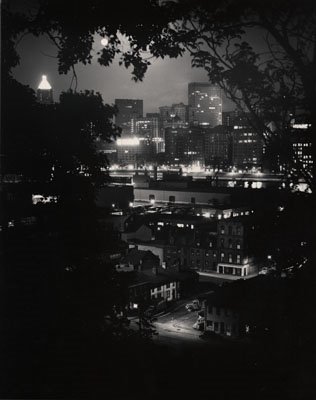by Philip Levine
I bought a dollar and a half's worth of small red potatoes,
I bought a dollar and a half's worth of small red potatoes,
took them home, boiled them in their jackets
and ate them for dinner with a little butter and salt.
Then I walked through the dried fields
on the edge of town. In middle June the light
hung on in the dark furrows at my feet,
and in the mountain oaks overhead the birds
were gathering for the night, the jays and mockers
squawking back and forth, the finches still darting
into the dusty light. The woman who sold me
the potatoes was from Poland; she was someone
out of my childhood in a pink spangled sweater and sunglasses
praising the perfection of all her fruits and vegetables
at the road-side stand and urging me to taste
even the pale, raw sweet corn trucked all the way,
she swore, from New Jersey. "Eat, eat" she said,
"Even if you don't I'll say you did."
Some things
you know all your life. They are so simple and true
they must be said without elegance, meter and rhyme,
they must be laid on the table beside the salt shaker,
the glass of water, the absence of light gathering
in the shadows of picture frames, they must be
naked and alone, they must stand for themselves.
My friend Henri and I arrived at this together in 1965
before I went away, before he began to kill himself,
and the two of us to betray our love. Can you taste
what I'm saying? It is onions or potatoes, a pinch
of simple salt, the wealth of melting butter, it is obvious,
it stays in the back of your throat like a truth
you never uttered because the time was always wrong,
it stays there for the rest of your life, unspoken,
made of that dirt we call earth, the metal we call salt,
in a form we have no words for, and you live on it.
This poem is from Levine’s 1995 collection of poems with the same title. What I love about this poem is the “hinge” in the middle. On a first reading it seems like second stanza is the explanation for the first and the poem moves from a pure description of an experience to its deeper meaning. Reading over it again though, the two parts are very similar, describing even the same cooking and eating of potatoes. Still something changes. The deeper meaning of all these stories (the woman from Poland, Henri, the seasons, “the absence of light gathering / in the shadows of picture frames) is simple, yet inexpressible. I think I’ve turned to this poem again and again because it captures the strange complexity of living. We know things and we know others know things and we know others share those things what we know, but we never really know what those things are. The kindness of others, the melting butter, even our memories are real and important, but mysterious and unknown. We share so much, but still we don’t know each other and find ourselves asking somewhat nonsensical questions like “Can you taste / what I’m saying?”, hoping to get at something we can’t even describe. The simple truth isn’t simple, but still, it is.
(submitted by s. sharma)
This poem is from Levine’s 1995 collection of poems with the same title. What I love about this poem is the “hinge” in the middle. On a first reading it seems like second stanza is the explanation for the first and the poem moves from a pure description of an experience to its deeper meaning. Reading over it again though, the two parts are very similar, describing even the same cooking and eating of potatoes. Still something changes. The deeper meaning of all these stories (the woman from Poland, Henri, the seasons, “the absence of light gathering / in the shadows of picture frames) is simple, yet inexpressible. I think I’ve turned to this poem again and again because it captures the strange complexity of living. We know things and we know others know things and we know others share those things what we know, but we never really know what those things are. The kindness of others, the melting butter, even our memories are real and important, but mysterious and unknown. We share so much, but still we don’t know each other and find ourselves asking somewhat nonsensical questions like “Can you taste / what I’m saying?”, hoping to get at something we can’t even describe. The simple truth isn’t simple, but still, it is.
(submitted by s. sharma)


Love this, poem s. sharma (wink, wink, nudge, nudge). I've read it now several times and still find it enigmatic, but I know in my gut what he means by "it stays in the back of your throat like a truth/you never uttered because the time was always wrong". There are so many things like that in life. Painful, meaningful, troubling, powerful things we all carry with us. They are so profound and also just a part of everyday life. They sit by the salt shaker, like he says. I love the voice in this poem as well. It's immediate and candid. It hooks you from go.
ReplyDeleteThanks for posting! It makes me interested in Philip Levine. Who are his contemporaries? Who are his influences? This is where I wish I knew more about poetry.